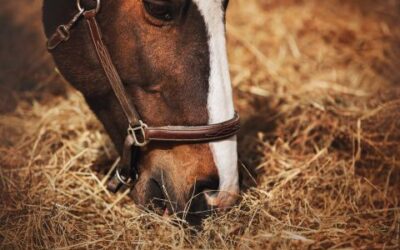
While horses are large and powerful, they can also be quite delicate and vulnerable. Their respiratory tract is one area where they can be susceptible to disease or difficulties. In this blog post, we take a look at three common respiratory illnesses in horses that can prevent them from breathing easily.
Heaves
Often compared to asthma in humans, heaves can make it difficult for your horse to breathe, especially when certain environmental triggers are present. Many horses have adverse reactions to dust and mold, both of which can commonly be found around the barn. These allergens will cause them to cough or wheeze. Often, horses with heaves can develop exercise intolerance, making it difficult to ride them.
Fortunately, you can often lessen the effects of heaves by reducing the negative environmental factors in your horse’s life. Feeding dust-free and mold-free hay, such as our Hi Fiber Gold, can help prevent the lungs from becoming irritated when your horse is in their stall. Additionally, nebulized medications are available (much like inhalers for humans) to soothe the condition and make it easier for your horse to breathe.
Equine Influenza
Equine influenza is a viral infection that can spread rapidly through a barn. According to Peter Heidmann, DVM, MPH, Dipl. ACVIM, “Study results indicate that as many as 95% of adult horses have already been infected and have strong immunity against it.” However, for some horses, equine influenza can cause horses to develop mucous-filled passageways and have difficulty breathing. Vaccinating is the best way to prevent equine influenza; however, biosecurity measures, especially at horse shows and other events, can help to minimize the spread of infection.
Equine Strangles
Strangles is a highly contagious bacterial infection of the bacteria streptococcus equi. It causes increased mucous production (often yellow and thick) and swelling of the lymph nodes. Many times, the lymph nodes develop abscesses, which may burst. In order to treat equine strangles, your vet may prescribe antibiotics or lance the lymph nodes to attempt to remove the infection from the body. Strangles is rarely fatal, but sometimes, extreme complications can develop.
These are three of the most common respiratory horse ailments. Do you have questions about your horse’s respiratory health? We encourage you to speak with your veterinarian, so they can perform a complete evaluation on your horse.




